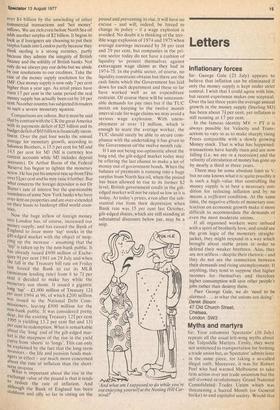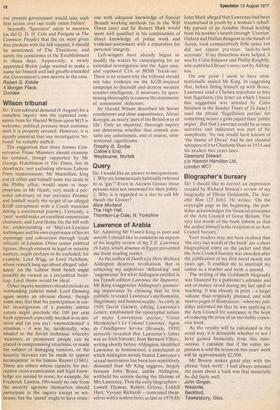Letters
Inflationary forces
Sir: George Gale (23 July) appears to believe that inflation can be eliminated if only the money supply is kept under strict control. I wish that I could agree with him, but recent experience makes one sceptical. Over the last three years the average annual growth in the money supply (Sterling M3) has been about 7i per cent, yet inflation is still running at 17 per cent.
In the famous identity MV = PT it is always possible for Velocity and Transactions, to vary so as to make sharply rising Prices compatible with a slowly growing Money stock. That is what has happened: transactions have hardly risen and are now falling (i.e. we are in a recession) and the velocity of circulation of money has gone up by nearly a third in three years.
There may be some absolute limit to V, but no one knows what it is: quite possibly it is such a high. value that controlling the money supply is at best a necessary condition for reducing inflation and by no means a sufficient condition. At the same time, the negative effects of monetary conk traction on economic growth make it more difficult to accommodate the demands of .even the most moderate unions.
If all organised workers were imbued with a spirit of brotherly love, and could see the grim logic of' the monetary straightjacket, they might respond in a way which brought about stable prices in " order to defend their weaker brethren. Alas, they are not selfless —despite their rhetoric — and they do not see the connection between their demands and rising unemployment. It' anything, they tend to suppose that higher incomes for themselves and therefore higher consumption will save other people's jobs rather than destroy them.
Pace George Gale, we do 'need to be alarmed . . . at what the unions are doing'. r Derek Bloom 47 Old Church Street, Chelsea, London SW3 •
Myths and martyrs
Sir: Your columnist 'Spectator' (30 July) repeats all the usual left-wing myths about the Tolpuddle Martyrs. Firstly, they were not sentenced to transportation for fortning a trade union but, as 'Spectator' admits later in the same piece, for taking a so-called illegal oath. Moreover, it was Sir Robert Peel who had warned Melbourne to take firm action over not trade unionism but the self-tivowed revolutionary Grand National Consolidated Trades Union which was threatening a Sacred Month (or General Strike) to end capitalist society. Would that our present government would take such firm action over our trade union bullies!
Secondly, 'Spectator' omits to mention (as did G. D. H. Cole and Postgate in The Common People) that the six were given free pardons with the full support, it should be mentioned, of The Thunderer, and surely the conscience of the Establishment in those days. Apparently, a newly appointed Welsh judge wanted to make a name for himself and had greatly exceeded the Government's own desires in the case. Robert G. Kiddie
4 Morgan Place, Dundee
Wilson tribunal
Sir: Your editorial demand (6 August) for a complete inquiry into the reported comments from Sir Harold Wilson upon M15 is welcome; political pressure must continue until it is properly secured. However, it is equally essential that any investigative 'tribunal' be suitably Staffed.
The suggestion that three former Conservative Prime Ministers should examine his conduct, though supported by Mr George Hutchinson in The Times, has its drawbacks, not excluding obvious Labour Party repercussions, Mr Macmillan, lOng out of office and himself none too acute in the Philby affair, would seem as inapptopriate as Mr Heath, very much a personal adversary of our previous Premier and himself nearly the target of an alleged KGB entrapment with a Czech musician dating a continental journey. Certainly, a 'peer' would make an excellent commission, chairman; and Lord Home fits the bill with his understanding of Marxist-Leninist techniques and his own experience of Soviet espionage and subversion through 'trade officials' in London. Other senior political figures; though eminent in legal or security matters, ought perhaps to be excluded; for example, Lord Wigg, or Lord Hailsham, whose remark long ago about alleged 'adulterers' on the Labour front bench might possibly be viewed as a prejudicial handicap. Lord Home would be ideal.
Other inq uiry members should include an outstanding judicial mind: Lord Denning again seems an obvious choice, though some may feel that his participation in earlier investigations of a possibly similar nature might preclude the 100 per cent fresh approach especially needed in so sensitive and (as you say) 'unprecedented' a situation — it was he, incidentally, who alluded to the Soviet technique whereby 'ministers or prominent people can be placed in compromising situations, or made the subject of damaging rumours, or the Security Services can be made to appear incompetent' in his famous Report (1963). There are others whose capacity for perceptive cross-examination and legal knowledge are second to none; for example, Sir Frederick Lawton. Obviously no one from the security agencies themselves should participate in the inquiry except as witnesses, but the `panel' ought to have some-, one with adequate knowledge of Special Branch working methods (as in the Will Owen case) and Sir Robert Mark would seem well qualified in his combination of direct knowledge of police work and evidence-assessment with a reputation for personal integrity.
Left-wingers have already begun to muddy the waters by campaigning for an extended investigation into the Agee case, and supposed CIA or BOSS 'break-ins': There is no reason why the tribunal should not take evidence on the KGB-inspired campaign to discredit and destroy western counter-intelligence, if necessary by questioning thoroughly in camera the statements of communist defectors.
Sir Harold Wilson described his Soviet counterpart and close acquaintance, Alexei Kosygin, as nearly 'part of the British way of life'. Only an impartial, thorough inquiry can determine whether that remark contains any unfortunate, and of course, unintentional, significance.
Timothy B. Scribe Callow's End, Weybourne, Norfolk
Query
Sir: I would like an answer to two questions: 1. Why are homosexuals habitually referred to as 'gay"? Even in Ancient Greece these persons were not renowned for their jollity.
2. Why is it regarded as a slur to call Mr Heath the Grocer?
Alice Morland The High Hall, Thornton-Le-Dale, N. Yorkshire
Lawrence of Arabia
Sir: Admiring Mr Francis King as poet and novelit I should like to comment on aspects of his lengthy review of my T.E. Lawrence (9 July), which absence in Egypt prevented me from reading earlier.
As the author of Death o f a Hero Richard Aldington deserves revaluation. But in criticising my adjectives 'debunking' and 'ungenerous' for what Aldington entitled in his French edition Lawrence the Impostor, Mr King exaggerates Aldington's pioneering importance by claiming that he first publicly revealed Lawrence's mythomania, illegitimacy and homosexuality. As early as 1938 David Garnett, editing Lawrence's Letters, emphasised the apocryphal nature of many Lawrentian stories; Victor Meulenyser's Le Colonel Lawrence, Agent de l'Intelligence Service (Brussels, 1939) correctly revealed that Lawrence's father was an Irish baronet; Jean Bernard Villars, writing shortly before Aldington, identified Lawrence as homosexual, a conclusion at which Aldington merely hinted. Lawrence's sexual motivation has been less repetitively dissected than Mr King suggests, largely because John Bruce, unlike Aldington, withheld his secrets during the lifetime of Mrs Lawrence, Thus the early biographers — Lowell Thomas, Robert Graves, Liddell Hart, Vyvyan Richards — contented themselves with a sexless hero; as late as 1976 Dr
John Mack alleged that Lawrence had been traumatised in youth by a woman's rebuff. My pursuit of an Ariadne thread leading from his mother's hearth through Uranian' Oxford and Halfati dungeon to the basalt of Azrak, took comparatively little space but did not repeat previous 'lash-by-lash accounts'. If my dissections were helped, it was by Colin Simpson and Phillip Knightly, who published Bruce's story: not by Aidington.
On one point I seem to have unintentionally misled Mr King. In suggesting that, before fitting himself up with Bruce, Lawrence used a Chelsea reprobate to hire him flagellants (the letter on which I based this suggestion was attested • by Colin Simpson in the Sunday Times of 26 June) 1 used the phrase 'flagellation parties' for something nearer a grim piquet than 'public orgies'. ,But that Lawrence could be at once secretive and indiscreet was part of his complexity. No one would have known of 'the shame of Deraa' had he not shouted whispers of it to Charlotte Shaw in 1924 and his readers two years later.
Desmond Stewart c/o Hamish Hamilton Ltd, London WC1
Biographer's bursary
Sir: I should like to correct an impression created by Richard Boston's review of my biography of Oliver Goldsmith, The Notable Man (23 July), He writes: 'On the copyright page at the beginning, the publisher acknowledges the financial assistance of the Arts Council of Great Britain. The very last words of the book inform us that the author himself is the recipient of an Arts Council bursary.'
Your readers may not have realised that 'the very last words of the book' are a short biographical entry on the jacket and that the Arts Council bursary was awarded after the publication of my first novel nearly ten years ago. It enabled me to interrupt my career as a teacher and write a second.
The writing of the Goldsmith biography was financed by a publisher's advance and out of money saved during my last spell of teaching. It was already in print — a larger volume than originally planned, and with twelve pages of illustrations— when my publisher informed me that he was applying to the Arts Council for assistance in the hope of reducing the price of an inevitably expensive book.
As the royalty will be calculated in the usual way, it is debatable whether or not I have gained financially from this intervention. I calculate that if the entire impression is sold the return on two years' work will be approximately £2,500.
Mr Boston makes great play with the phrase 'hack work'. I had always assumed the point about a hack was that materially he did fairly well.
John Ginger, Westville, Beckford, Tewkesbury, Glos.



































 Previous page
Previous page